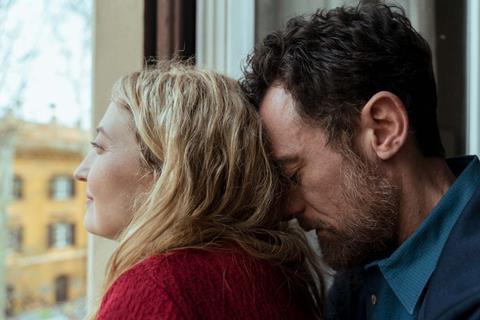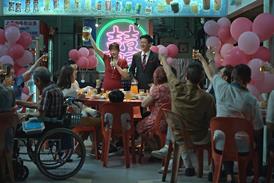The Spanish director’s latest plays Tallinn after its Toronto premiere

Dir: Isabel Coixet. Italy/Spain. 2025. 120mins
A shock diagnosis informs Isabel Coixet’s latest drama, which is based on the autobiographical novel by late Sardinian writer Michela Murgia who died of cancer in 2023. It comes 23 years after Coixet’s award-winning My Life Without Me, about a young woman preparing the ground for her own death. Viewers with fond memories of that now have the chance to enjoy the Rome-set Three Goodbyes, which has a similar setup – a judicious, low-key approach to the performances and presentation of this potentially soppy material; careful attention to the truthfulness of the relationships; and a quietly devastating final act.
A judicious, low-key approach
Having premiered in Toronto, the film now plays Tallinn as part of a healthy festival run. It released in Italy in October and is due in French theatres in February 2026; its universally appealing message has also led to brisk sales in a range of other global territories, and could well attract discerning international audiences.
The first goodbye is between physical education schoolteacher Marta (Alba Rohrwacher) and her go-getting restaurateur husband Antonio (Elio Germano), following a seemingly trivial argument that destabilises their seven-year relationship. The ultra-reserved Marta, played by Rohrwacher as rather melancholic and monochrome but with thoroughly relatable insecurities, is too unwilling to get out of her comfort zone for Antonio’s taste. This doesn’t bother her work colleague Agostino (winsomely played by Francesco Carril), who clearly fancies Marta but spends the whole film yearning for her instead of doing anything about it.
Marta, meanwhile, in one of this very conventional film’s few nods to eccentricity, finds a cardboard cut-out of an (invented) K-Pop star called Jirko (Sungku Jung), takes it home and starts talking to it. It’s a device that works better on the pages of Murgia’s novel than on the screen: apart from anything else, Marta appears to have no other interest in K-Pop whatsoever.
One of the script’s main strengths is in its nuanced take on relationships. Marta may be the main focus, but she is far from the only one – Antonio will remain tortured throughout by his breakup with her, working out his issues via another of the film’s unfulfilled affairs; in this case with his employee Silvia (Galatea Bellugi), another character who seems unable to find what she’s looking for. Marta’s sister pretentious Elisa (Silvia D’Amico) meanwhile, is merely annoyingly egotistical.
These various relationships are carefully set up early on, too slowly – though Coixet has wisely decided not to force the pace to give us time to understand and care about the characters before the big dramatic kick. It’s thus only after the hour mark that Marta’s loss of appetite, following a trip to a sympathetic gastroenterologist (Sarita Choudhury), is revealed to be cancer.
Rather than internally collapsing or going numb after her diagnosis, Marta remarkably seems to feel a sense of liberation, and goes to work setting her world to rights in small, human ways. That this feels entirely credible is testament to the quiet, involving strength of Rohrwacher’s performance, which is very busy under its apparently placid surface. Coixet, too, handles this ‘seize the day’ message with undramatic restrait.
The Rome featured in Three Goodbyes is not the picture postcard city of the Trevi Fountain and the Colosseum, but rather the neighbourhoods where ordinary Romans go about their lives - though D.P. Guido Michelotti’s insistence on soft, warm tones and on framing it to enhance its beauty does sometimes smack of the promotional tourist video. Alfonso Villalonga’s pretty score is likewise too present, sometimes carrying the emotional burden through scenes in which the performance and acting are perfectly capable of doing the lifting on their own. That said, one lengthy sequence towards the end is elevated wonderfully by featuring Nina Simone’s stunning version of Hoagey Carmichael’s “I Get Along Without You Very Well”.
Production companies: Cattleya, Ruvido Produzioni, Bartlebyfilm, Buenapinta Media, BTeam Prods, Perdicion Films, Apaches Entertainment, Tres Cuencos AIE
International sales: Vision Distribution info@visiondistribution.it
Producers: Massimo Di Rocco, Luigi Napoleone, Riccardo Tozzi, Giovanni Stabilini, Francesca Longardi, Marisa Fernandez Armenteros, Sandra Hermida, Carlo Gavaudan, Marco Miana
Screenplay: Enrico Audenino, Isabel Coixet, based on a novel by Michela Murgia
Cinematography: Guido Michelotti
Production design: Paola Comencini
Editing: Jordi Azategui
Music: Alfonso Villalonga
Main cast: Alba Rohrwacher, Elio Germano, Francesco Carril, Silvia D’Amico, Galatea Bellugi, Sarita Choudhury, Giorgio Colangeli, Sofia D’Elia
























